Interview with Ali Benjamin by Oz Books manager Trianne Harabedian.
Ali Benjamin is the author of two middle-grade books, the newly released The Next Great Paulie Fink and 2015’s The Thing About Jellyfish, which was a finalist for the National Book Award for Young People’s Literature. Benjamin will be at Lemuria on Thursday, April 25, at 5:00 to sign and read from The Next Great Paulie Fink.
Where are you from, and where do you live now?

Ali Benjamin
I grew up about an hour from New York City, in a community along the Hudson River. At the time, my hometown was where NYC suburbs gave way to something more ex-urban. As a result, my schools had kids from varied socioeconomic backgrounds. There were the “commuting” families, who tended to be wealthier and white collar, as well as many less affluent blue-collar workers.
Most houses in my neighborhood were newer ranch houses (often with freshly mowed lawns). My family’s home was…different. It was about 200 years old, with peeling paint and the occasional rotting floorboard. Most of the neighborhood kids thought it was haunted (though I never saw evidence of that). My parents were hippies, which other families in the neighborhood definitely were not! It’s funny; my sister became an award-winning documentary filmmaker, and I became a writer. Sometimes I wonder if growing up a little different from your peers is a natural springboard into storytelling!
We had lots of freedom back then; kids wandered the neighborhood, organizing games of kick-the-can or flashlight tag. I tried to capture some of that sense of freedom and expansiveness in The Next Great Paulie Fink. In fact, there’s a story within the book about a game of team-tag that comes directly from a specific moment in the neighborhood!
Today I live in Western Massachusetts—I’m only a few miles from both the Vermont and New York state borders. There are still many small farms in this area, so I’ve had a little experience with goats, an animal that appears repeatedly in The Next Great Paulie Fink!
Can you tell us, in your own words, what The Next Great Paulie Fink is about?
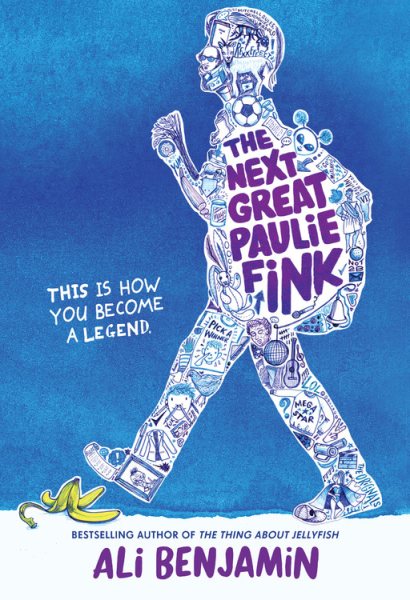 The Next Great Paulie Fink is about an oddball group of seventh grade students who organize a reality TV-style competition to “replace” their legendary class clown, Paulie Fink, who mysteriously doesn’t return at the start of the school year. The story goes back and forth between a straightforward narrative—told through the eyes of “new girl” Caitlyn, who is reluctantly put in charge of the competition—and interviews with Caitlyn’s classmates as they share memories of Paulie’s most ingenious pranks.
The Next Great Paulie Fink is about an oddball group of seventh grade students who organize a reality TV-style competition to “replace” their legendary class clown, Paulie Fink, who mysteriously doesn’t return at the start of the school year. The story goes back and forth between a straightforward narrative—told through the eyes of “new girl” Caitlyn, who is reluctantly put in charge of the competition—and interviews with Caitlyn’s classmates as they share memories of Paulie’s most ingenious pranks.
But the book is also about the stories we tell each other and to ourselves: how can we know if the stories we tell are “true?” Where, exactly, is the line between reality and myth? What if the stories we tell ourselves no longer serve us? Who might we get to become if we choose a new story? The book is also about celebrity culture; whom we elevate into legendary status, and why, and whether we ever know these idols —or anyone—as well as we think we do. These bigger questions, though, are woven into a very lighthearted narrative, so kids can access the book at different levels.
Even though the kids in the book talk a lot about Paulie Fink, the story is really about Caitlyn Breen. What made you want to tell her story?
A couple of years ago, I got ahold of my middle school diary. I was so excited to read it and become reacquainted with my 12-year-old self. I thought I remembered, more or less, who I’d been back then. In my memory, I’d been a nice kid—kind of nerdy, very distracted, pretty immature, and definitely in over my head in the chaotic world of middle school. But I was kind…or so I thought.
Except that’s not what the pages showed me. My diary was filled with page after page of nasty comments about my classmates, my friends, my family, my teachers. I was also obsessed with where I stood in the middle school hierarchy, almost as if I were a reality star trying to claw my way toward the top. But as I read through the pages with my adult eyes, I could also see how incredibly insecure I was, how lost. And of course, that’s precisely why I was so mean! Genuinely confident people don’t need to put others down.
Caitlyn’s in a similar place as I’d been. At the story’s start, she’s not particularly nice, and she’s clinging to “rules” that she thinks will help her gain social currency. But as the competition to find the Next Great Paulie Fink unfolds, she begins to realize that those old ways aren’t actually serving her. So, she begins to do what my middle school self wasn’t able to: to set down her obsession with popularity, to really see and value the people around her, and to have a little fun for a change. I think I gave to Caitlyn what I myself needed when I was in middle school!
Can you tell us about myths and legends and why they’re so important in this book?
Stories drive the world forward. They always have. They don’t merely reflect who we are, and what we value, they actually shape us in ways that are active and direct. This is something I tried to show throughout the book. For example, at a critical moment, Caitlyn thinks of a kindergarten student who idolizes her. By asking herself, “what if I were the person this child sees? What would that version of me do now?” she’s able to become a little better than she might have been otherwise.
Every character in The Next Great Paulie Fink gets the opportunity to try on a new story. In doing so, they open themselves to new possibilities. Their worlds get a little richer.
And it’s worth noting that no story—not even a true story, in which every element is 100 percent factually accurate—ever reflects the full reality of this world. Every story involves a series of choices: who is the protagonist? Who’s the villain or the scapegoat? Which details are brought to the forefront? Which are left out altogether? These choices are what makes it a story, instead of merely a collection of facts.
Too often, our stories are so baked into our experiences that we don’t notice them. We’re like fish who don’t notice the water we’re swimming in! The Next Great Paulie Fink is a very lighthearted way to explore some of these issues.
What is the most important lesson that you want us to take away from this story?
First, I hope it gives kids permission to let themselves have some fun. The kids in The Next Great Paulie Fink are goofy. They’re totally un-self-conscious. They love to laugh and to be silly. They do ridiculous dances. They wrestle like zombies. They imitate robots and aliens, chase runaway goats, and they love every minute of it! I’d like to see more kids give themselves permission to be so free.
Second, I hope the book encourages them to think critically about their world. Human beings tell each other, and themselves, a lot of stories. Not all of them are true. Some of them have elements of truth, but are inherently incomplete. I wanted to give kids a way to begin to really examine the stories that drive them, to open themselves up to the possibility that their stories are part of a much bigger tapestry. The more they can see that, the bigger, and more meaningful, their lives can become.


 “But it’s a middle grade book,” I told myself. “It’s for ages nine to twelve. How scary can it be?” Not scary at all, as it turned out! In fact, I devoured it like pizza on a late night. It was the most engaging middle grade novel I’ve read in a long time.
“But it’s a middle grade book,” I told myself. “It’s for ages nine to twelve. How scary can it be?” Not scary at all, as it turned out! In fact, I devoured it like pizza on a late night. It was the most engaging middle grade novel I’ve read in a long time.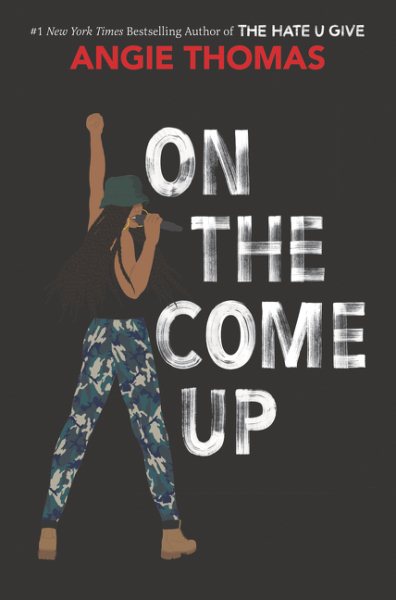 Thomas returns to the fictional Garden Heights community of The Hate U Give in her follow-up novel, On the Come Up. In this book, 16-year-old Bri Jackson overcomes other people’s expectations for her to find her voice and use her talent for hip-hop to communicate her place in the world. From the “ring battles” in a local boxing gym to the SoundCloud-inspired accounts of the internet, Bri always goes forth boldly to remind the world that “when you say brilliant that you’re also saying Bri.”
Thomas returns to the fictional Garden Heights community of The Hate U Give in her follow-up novel, On the Come Up. In this book, 16-year-old Bri Jackson overcomes other people’s expectations for her to find her voice and use her talent for hip-hop to communicate her place in the world. From the “ring battles” in a local boxing gym to the SoundCloud-inspired accounts of the internet, Bri always goes forth boldly to remind the world that “when you say brilliant that you’re also saying Bri.”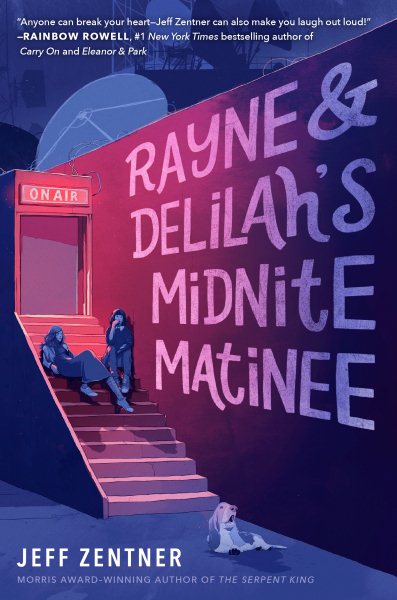 Rayne and Delilah’s Midnite Matinee
Rayne and Delilah’s Midnite Matinee
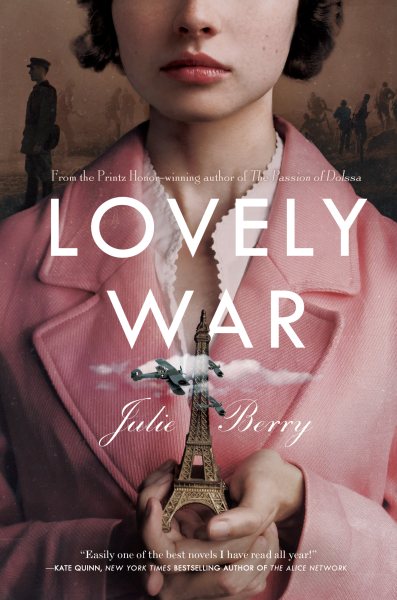 So I absolutely have to tell you about another book that you are going to love:
So I absolutely have to tell you about another book that you are going to love: 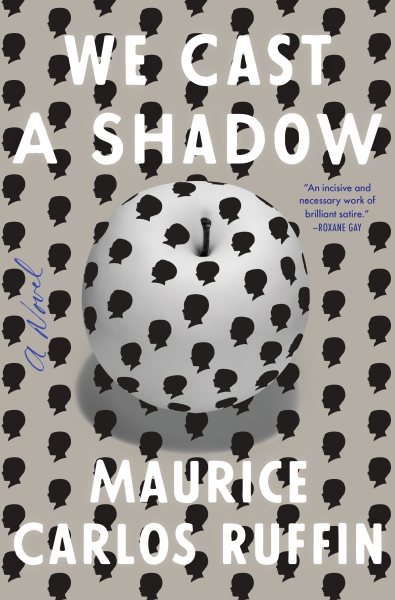 Narrated by a black father frantically climbing the ladder at a prominent law firm to gain enough money to pay for his biracial son Nigel’s demelanization procedure, We Cast a Shadow is a Kafkaesque nightmare for our times, a fever dream of a novel that is painfully aware of how close America is to becoming a white ethnostate run by reptilian billionaires.
Narrated by a black father frantically climbing the ladder at a prominent law firm to gain enough money to pay for his biracial son Nigel’s demelanization procedure, We Cast a Shadow is a Kafkaesque nightmare for our times, a fever dream of a novel that is painfully aware of how close America is to becoming a white ethnostate run by reptilian billionaires.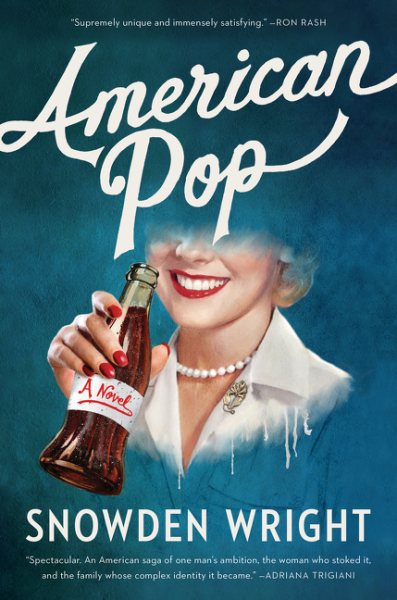 I was very excited to see a family tree in the first few pages. From Gabriel García Márquez’s One Hundred Years of Solitude to Yaa Gyasi’s
I was very excited to see a family tree in the first few pages. From Gabriel García Márquez’s One Hundred Years of Solitude to Yaa Gyasi’s 
 The Weight of a Piano surprised me in the amount of technical detail Cander used when describing musical technique and the titular piano. It is so easy to see Katya’s love of music throughout the novel, which is portrayed by Cander’s poetic description of the piano and the music played on it. I was easily able to relate to Katya and the way music brings her joy and conveys her feelings, as well as the way music connects characters to one another, even across time, because I often feel this way about classical music. As a classical musician, it also felt extra special to be able to understand Katya’s emotional connection to the piano and the music she plays on it.
The Weight of a Piano surprised me in the amount of technical detail Cander used when describing musical technique and the titular piano. It is so easy to see Katya’s love of music throughout the novel, which is portrayed by Cander’s poetic description of the piano and the music played on it. I was easily able to relate to Katya and the way music brings her joy and conveys her feelings, as well as the way music connects characters to one another, even across time, because I often feel this way about classical music. As a classical musician, it also felt extra special to be able to understand Katya’s emotional connection to the piano and the music she plays on it.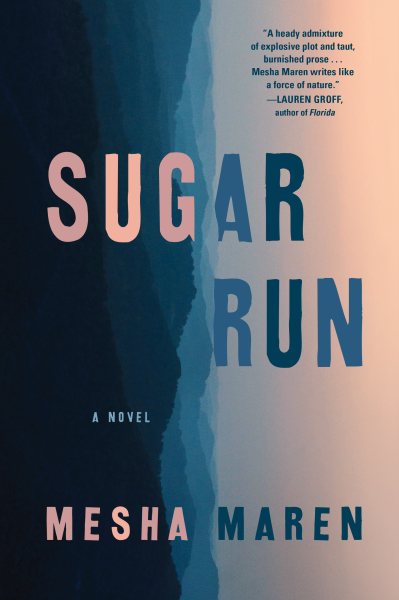 This novel certainly gave me what I was looking for. With a fantastically driven plot, compelling prose, and beautiful descriptions of that unique, rural, mountainous region of West Virginia, this novel was really hard to put down. I found myself carving time to read this novel into every moment of my day, something I haven’t done with a novel (one not for school) in a long time.
This novel certainly gave me what I was looking for. With a fantastically driven plot, compelling prose, and beautiful descriptions of that unique, rural, mountainous region of West Virginia, this novel was really hard to put down. I found myself carving time to read this novel into every moment of my day, something I haven’t done with a novel (one not for school) in a long time.